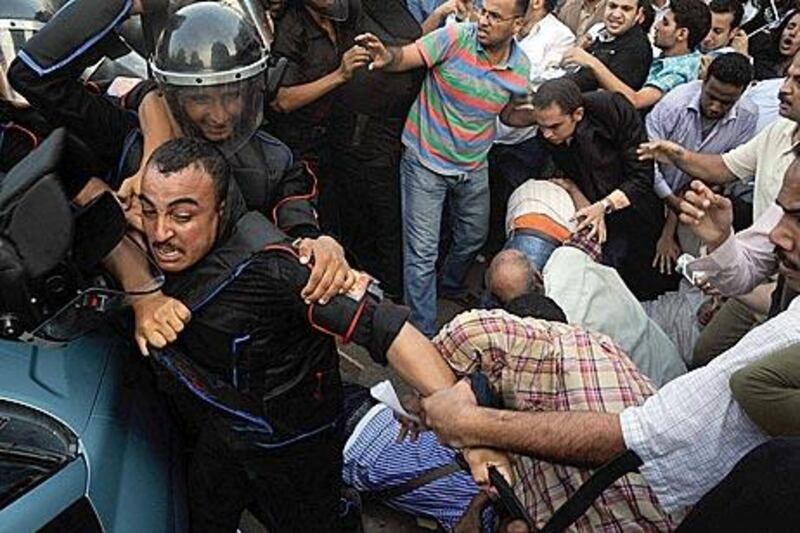CAIRO // The suspension of licences for 12 satellite channels has left media analysts wondering whether the move was the latest in a government assault on independent media ahead of parliamentary elections next month or a strategy to allay rising sectarian tensions.
In a press release Tuesday afternoon, Egypt's minister of information announced that the satellite broadcaster NileSat, which is owned primarily by government companies, suspended the 12 licences and issued citations for 20 other companies because their programming encouraged "incitement to religious hatred, unlicensed medical advice and obscenity".
"Among the most egregious of these violations are repeated broadcast calls by extremist presenters for the excommunication, banishment and murder of Shiite Muslims, and the promotion of so-called 'herbal cures' for Cancer and Hepatitis B and C," wrote Anas al Fiky, the minister of information, in a statement.
"These violations were committed with full consciousness and disregard for their dangerous implications for public security and safety."
NileSat's decision comes amid a spate of perceived government limitations on media freedom over the past month.
But none of the satellite channels was known for its uniquely trenchant criticism of Egypt's ruling regime, said Gamal Zayda, a regular columnist and managing editor for the government-owned Al Ahram newspaper.
"I'm with the freedom of expression, but I mean in every society they have the right to organise this freedom of expression," Mr Zayda said. "It's just not open like that, especially when you use this freedom to endanger the whole society like the religious channels have been doing for the past few years."
Satellite programmes that air the views of conservative Salafi preachers, which include suspended stations such as Al-Rahma and Kuwait's Safa, often share part of the blame for the generation-long rise of religious conservatism in Egyptian society.
In the past month, Egyptian Salafi leaders have led regular demonstrations against the country's Coptic Christian minority after prominent members of the Christian clergy made inflammatory statements about Islam.
While the satellite stations were disciplined for their anti-Shiite programming, one analyst said their temporary suspension could still be the result of the government's increasing wariness over the rising power of Salafi Islam.
Samer Soleman, an associate professor of political economy at the American University in Cairo (AUC), said: "There is some pressure on the state to respond to the sectarian strife. These religious channels are very dangerous, so why not close them? This is very good."
But when placed alongside the moves on the media of the past month, Tuesday's suspensions and citations may also reveal a government that is growing wary of the country's young independent media.
Thanks to liberalised enforcement of statutes governing media in the past five to 10 years, independently-owned newspapers and television channels have emerged as major competition to the government-owned communications groups that dominated news-gathering and commentary for generations.
As evidence of a crackdown, critics point to the sacking this month of Ibrahim Eissa, a prominent dissident voice in Egyptian politics, from his post as editor-in-chief of Al Dustor, a daily independent newspaper.
The 12 suspended stations will join five other satellite channels the Egyptian government suspended last week for promoting religious intolerance.
The government also recently announced new rules that will oblige companies that send mass text messages to first register with the government - a regulation that some say is aimed at subduing opposition political organisers.
Walid Kaziha, a professor of political science also at AUC, said: "I think the government is in the final stages of positioning itself to have full control of the outcome" of parliamentary elections. "Some of these stations have been there for some time and there have been no complaints against them. And now, since we are moving closer toward parliamentary elections, I think the government … would obviously like to have a more comfortable situation than before."
But for others, the suspensions come down to a question of timing: Why would the government seek to restrain Egypt's media - which enjoy a reasonable capacity to criticise government institutions - only a month before elections?
Sherif Younes, a history professor at Helwan University, said: "To keep the regime safe, it is not necessary for this regime to stop all criticism of the government, but maybe to confront some aspects of that." The government, Professor Younes said, recognises that moderately critical voices represent an important catharsis for the Egyptian people. "That would be very stupid for them if they decide to close the safety valve. I mean that criticism is important for such a regime."
Indeed, as far as the regime is concerned, the damage from independent media has already been done, and there is no going back, Professor Soliman said. If the government sincerely wanted to silence its critics, he said they would do so through tried-and-true methods: applying political pressure on the owners and editors of independent media outlets.
"We are always suspicious. We don't trust [the government] and we know that they are capable of doing such things," Professor Soliman said. "I'm refuting this theory not because I believe that [the government] respects freedom of expression. I'm refuting it because I think they have other measures of control and they are capable of adapting to the situation where public speech is free."





